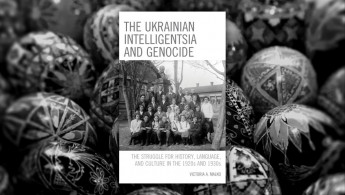The Ukrainian Intelligentsia and Genocide: The Struggle For History, Language, And Culture in the 1920s and 1930s
Victoria Malko’s The Ukrainian Intelligentsia and Genocide: The Struggle For History, Language, And Culture in the 1920s and 1930s explores the destruction of Ukrainian writers, teachers and thinkers by the Soviet Union.
The Holodomor, which translates into English as ‘Death by Hunger’, was one of the most brutal man-made famines of the 20th century claiming between 3-5 million lives.
Inflicted upon the Eastern European nation by Joseph Stalin in an attempt to crush nationalist rebellions, Malko’s book shows the brutality of Stalin’s methods went beyond one dictator’s exploits and was deeply rooted in both Russian imperialistic discourse and Communist ideology as officially adopted by Moscow.
“It [Ukraine] has become for Russia what Ireland was for England: exploited in the extreme and receiving nothing in return,” Vladimir Lenin declared in a speech.
The Ukrainian Intelligentsia and Genocide... is a timely reminder that the ghosts of the near past may not only be a thing for the history books"
Russia has a long history of intervening in or controlling Ukraine going back to the 18th century – different Tsar rulers attempted ‘Russification’ of the country, which included things like banning the printing of books in Ukrainian or restricting the language from being taught.
The idea of Ukraine as a separate nation from Russia has often been treated as a threat, the role of writers, thinkers and intellectuals in shaping Ukranianess made them a target.
While Russia’s Tsarist serves as an important backdrop to later atrocities by the Communist regime, as Malko argues, the 1932-1933 Holodomor has its roots in Marxist ideology too.
While Karl Marx regarded nationalism as a type of false consciousness, he didn’t necessarily think all nationalism was necessarily bad and indeed assimilation into certain great imperialist cultures was a critical stepping stone in the move towards Communism. “A worldwide communist international goal meant the liquidation of many nationalities by way of their amalgamation and transformation into a few large super-national complexes.
"National amalgamation could be only achieved by assimilation to the language and culture of a certain ‘great’ (‘first among equals’) imperial nation on the road to the ‘Internationally united’ communist world.”
For the likes of Lenin and Stalin that great culture that will create a shared language for the global working class was Russian and thus any nationalism outside of it was a threat to the viability of socialism itself.
Another key point for Karl Marx was in order for Communism to be achieved, there needed to be a large urbanised working-class, rural societies were not capable of bringing about this new order.
As Malko points out, “for Bolsheviks, who ruled over a largely agricultural population, there was an obvious problem. Besides, in the case of Ukraine, farmers were independent smallholders, hardworking, and nationally conscious; they overwhelmingly spoke Ukrainian, the language that Bolsheviks did not understand.”
Indeed, the elimination of private property and classes based upon it alongside hatred of rural life provided an ideological current for the Soviet leadership in dealing with Ukraine.
Kyiv paid a heavy price, by some estimates 400,000 farmers, clergy and intellectuals were deported outside Ukraine and 530,000 were sent off to labour camps between 1930-1938. Control of Ukraine was critical for Moscow as it has the ability to feed much of Europe and it was the centrepiece of state ideology.
|
For Stalin, Ukraine gave him the chance to compete with the west in terms of industrial and agricultural output, but he also wanted to try out Marxist ideas in the country.
He attempted to replace free trade with a 'bartering for goods system' between towns and countries, however, this failed as the state was not able to produce enough goods for bartering between places to work.
The 1932 famine was not merely a result of these failed policies but was in fact purposefully designed to subjugate a population that had grown rebellious against these failed reforms and the destructive nature of Soviet rule.
Indeed while Ukrainians were starving, they were still forced to meet grain production quotas to feed Russia, as Russian writer Sergei Maksimov wrote, “while Ukrainians are dying from starvation, we are drinking tea with jam, white bread, butter, cheese and buns.”
The Ukrainian Intelligentsia and Genocide would be chilling reading at the best of times, but as we are witnessing another Russian invasion of Ukraine with President Vladimir Putin denying Ukrainian peoplehood and discussing rebuilding the empire, it is a timely reminder that the ghosts of the near past may not only be a thing for the history books.
Victoria Malko gives important insight into the Holodomor and the historical context in which modern Ukraine came to be. The Ukrainian Intelligentsia is an essential read and an important tool is spreading awareness about the brutal genocidal famine campaign unleashed by Joseph Stalin.
Usman Butt is a multimedia television researcher, filmmaker and writer based in London. Usman read International Relations and Arabic Language at the University of Westminster and completed a Master of Arts in Palestine Studies at the University of Exeter.
Follow him on Twitter: @TheUsmanButt



